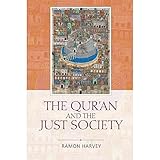The Qur'an and the Just Society / Ramon Harvey, M.A.S. Abdel Haleem.
Material type: TextPublisher: Edinburgh : Edinburgh University Press, [2022]Copyright date: ©2017Description: 1 online resource (288 p.) : 2 B/W illustrationsContent type:
TextPublisher: Edinburgh : Edinburgh University Press, [2022]Copyright date: ©2017Description: 1 online resource (288 p.) : 2 B/W illustrationsContent type: - 9781474403290
- 9781474417198
- 297.5 23
- BP173.43 .H37 2018
- BP173.43 .H37 2018
- online - DeGruyter
| Item type | Current library | Call number | URL | Status | Notes | Barcode | |
|---|---|---|---|---|---|---|---|
 eBook
eBook
|
Biblioteca "Angelicum" Pont. Univ. S.Tommaso d'Aquino Nuvola online | online - DeGruyter (Browse shelf(Opens below)) | Online access | Not for loan (Accesso limitato) | Accesso per gli utenti autorizzati / Access for authorized users | (dgr)9781474417198 |
Frontmatter -- Contents -- Foreword by M. A. S. Abdel Haleem -- Preface -- Acknowledgements -- Introduction -- Part I Qur’anic Ethics -- 1. Moral Narrative -- 2. Theology and Ethics -- 3. Hermeneutics -- 4. Historical Context -- Part II Political Justice -- 5. Politics -- 6. Peace -- 7. War -- Part III Distributive Justice -- 8. Trade -- 9. Alms -- 10. Marriage -- 11. Inheritance -- Part IV Corrective Justice -- 12. Public Crimes -- 13. Private Crimes -- Conclusion -- Notes -- Glossary of Arabic Terminology -- Bibliography -- Index of Qur’anic Verses -- Index of Biblical Verses -- General Index
restricted access online access with authorization star
http://purl.org/coar/access_right/c_16ec
Explores the ethical structure of the ‘just society’ within the Qur’anWhat is justice? How can it be realised within society? These are universal concerns and are central to the primary scripture of Islam, the Qur’an. Utilising a pioneering theological and hermeneutic framework adapted from both classical Muslim literature and contemporary academic studies of the Qur’an, Ramon Harvey explores the underlying principles of its system of social justice. Dividing his book into four parts, he covers Qur’anic Ethics, Political Justice (politics, peace, war), Distributive Justice (fair trade, alms, marriage, inheritance) and Corrective Justice (public and private crimes). His reading of the Qur’an reconstructs the text as normatively engaging these spheres of justice in their socio-historical context and lays the foundations for future contemporary articulations of Qur’anic ethics.Key FeaturesProvides a new reading of the Qur’an’s ethical world viewProposes an original methodology for understanding Qur’anic ethics in the light of Islamic theologyHighlights passages of the Qur’an that reveal new depth when connected to the broader thematic structure of Qur’anic justiceBroaches a conversation between Qur’anic ethics and wider theological and philosophical discourseDevelops a natural law reading of social justice themes in the Qur’an
Mode of access: Internet via World Wide Web.
In English.
Description based on online resource; title from PDF title page (publisher's Web site, viewed 29. Jun 2022)


